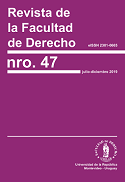Desagregando reformas:
sindicatos y reformas laborales en izquierdas moderadas
DOI:
https://doi.org/10.22187/rfd2019n47a10Palabras clave:
reformas laborales, gobiernos de izquierda, sindicatos, Uruguay, ChileResumen
¿Qué reformas en los mercados de trabajo han llevado adelante los gobiernos de izquierda en los últimos años? Esta pregunta es relevante porque nos permite indagar acerca de la relación entre trabajadores organizados y partidos de izquierda en el contexto posterior al auge de las reformas de mercado. Este trabajo describe como las reformas laborales de los gobiernos de izquierda en Chile y en Uruguay, dos izquierdas generalmente agrupadas como moderadas, tuvieron diferentes consecuencias para la organización y poder de la clase trabajadora en cada país. En Chile la llegada al poder de líderes de izquierda si bien representó mayores protecciones para los trabajadores, no tuvo consecuencias en el poder y la organización de los trabajadores formales. En Uruguay, sin embargo, la llegada al poder de la izquierda generó niveles de activación sindical similares a los que el país tenía antes de la liberalización. Este resultado se debió al diferente énfasis de las reformas laborales en cada caso. Mientras que en Chile, las reformas laborales de la Concertación se concentraron en los derechos individuales de lo trabajadores, en Uruguay las reformas modificaron profundamente los derechos colectivos.
Descargas
Publicado
Cómo citar
Número
Sección
Licencia
Los autores conservan sus derechos de autor y ceden a la revista el derecho de primera publicación de su obra, el cuál estará simultaneamente sujeto a la licencia Creative Commons Reconocimiento 4.0 Internacional License. que permite compartir la obra siempre que se indique la publicación inicial en esta revista.



